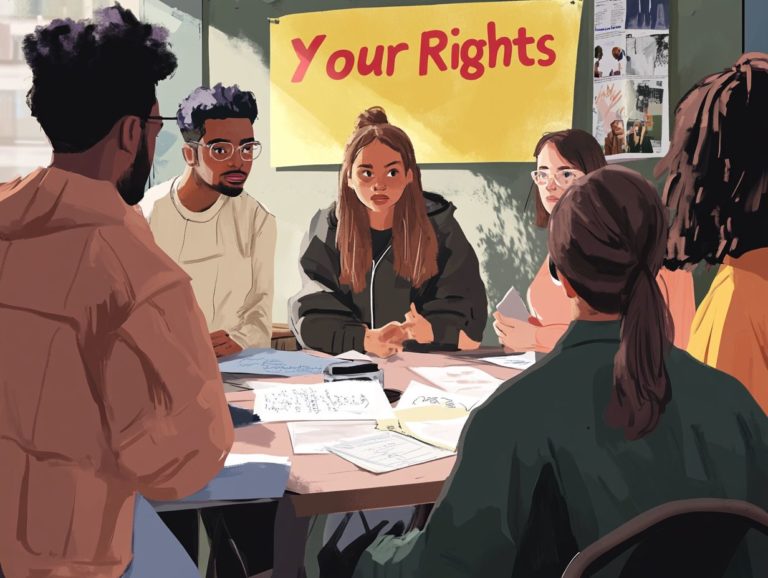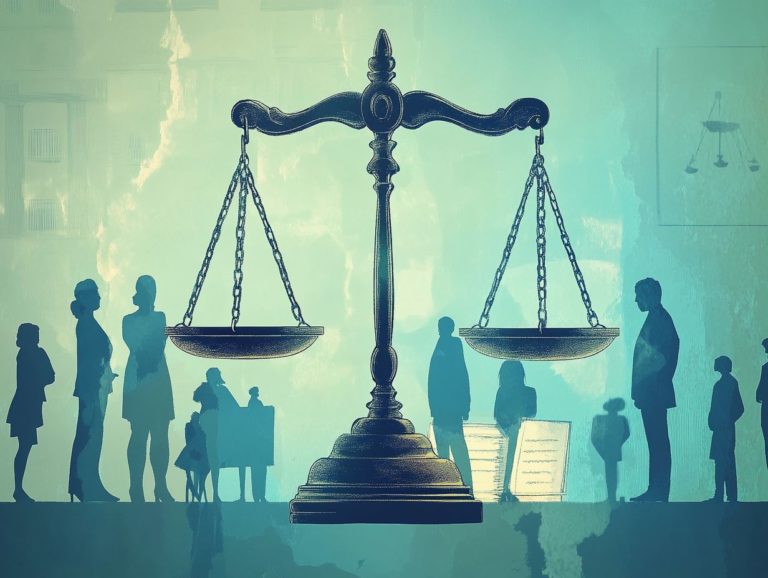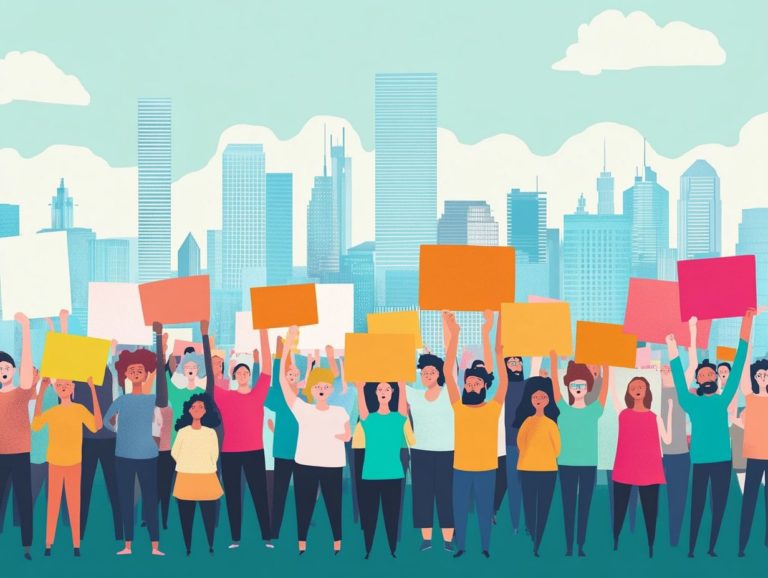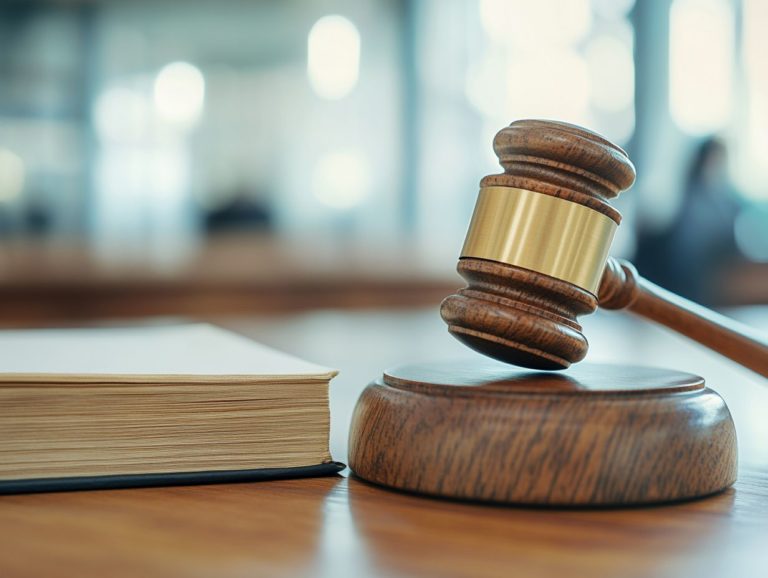What to Expect During a Court Hearing
Navigating a court hearing can feel intimidating, whether it’s your first time or you’ve been there before. Understanding what to expect is crucial for feeling prepared and confident.
This article provides essential guidance on gathering evidence, dressing appropriately, and presenting your case effectively. It also breaks down the roles of judges and juries, explores potential outcomes, and clarifies the appeals process.
By the end, you ll be armed with the knowledge you need to approach your court hearing with confidence.
Contents
Key Takeaways:
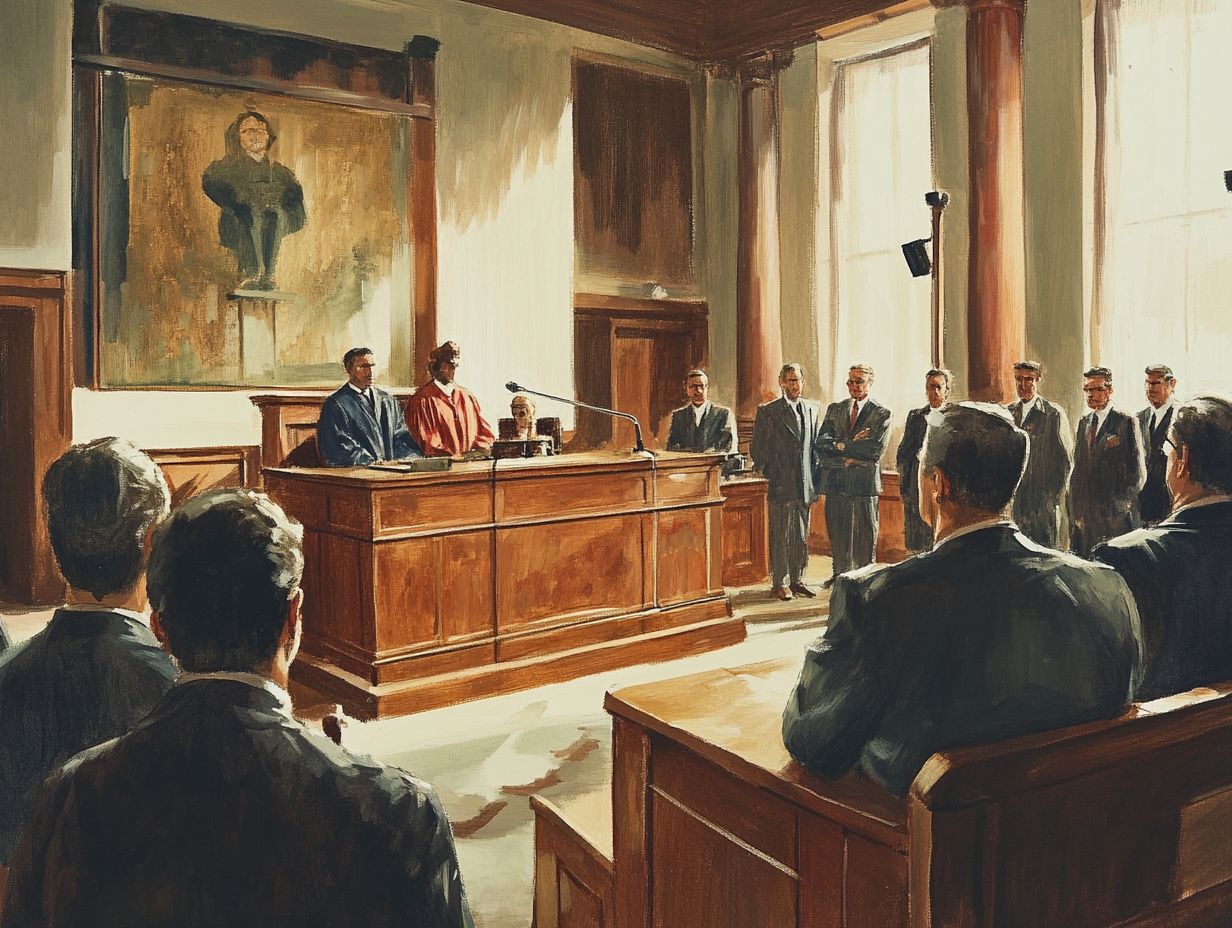
- Gather your evidence today!
- Dress to impress your judge and jury!
- Understand the roles of the judge and jury in your case.
Preparing for a Court Hearing
Preparing for a court hearing is essential to ensure both parties are well represented and that their rights are protected.
Diligent preparation can greatly affect the outcome of your case. This includes everything from the evidence you present to how you conduct yourself in court.
Whether you find yourself in a trial, a mediation session, or a hearing, grasping the expectations and responsibilities is vital. This involves gathering relevant documents, organizing your evidence, and familiarizing yourself with courtroom rules.
Gathering Evidence and Documents
Collecting evidence and documents is a key step in preparing for your court hearing. The strength of your case often relies on the quality and relevance of the evidence you present.
This process requires careful collection of various materials, including:
- witness statements that provide firsthand accounts,
- physical evidence that supports your claims,
- and legal documents that lay the groundwork for your case.
Every piece of evidence contributes to crafting a compelling story that resonates with judges and juries. Organizing these materials effectively can significantly enhance clarity and impact during the trial, ensuring that no crucial points are overlooked.
Understanding Court Procedures
Understanding court procedures is essential for anyone involved in a hearing or trial, as these rules govern how cases unfold and ensure a fair process.
Navigating the intricacies of the courtroom might feel daunting, but everyone plays a vital role in maintaining order and fairness. The judge oversees the proceedings to ensure that the law is applied justly. Meanwhile, the bailiff manages security and keeps order, while clerks handle important documentation and case records.
Observing proper courtroom etiquette is also important. Address the judge respectfully and remain silent when necessary. This contributes to upholding the integrity of the legal system, creating an environment where justice is served effectively.
What to Wear to a Court Hearing
Considering what to wear to a court hearing is crucial; your appearance can significantly influence how the judge, jury, and courtroom staff perceive you.
What you wear matters! Dressing well shows you respect the court and take the proceedings seriously. By adhering to courtroom dress codes, you can create a favorable impression, which may subtly influence the outcome of the trial.
Dressing Appropriately for the Occasion
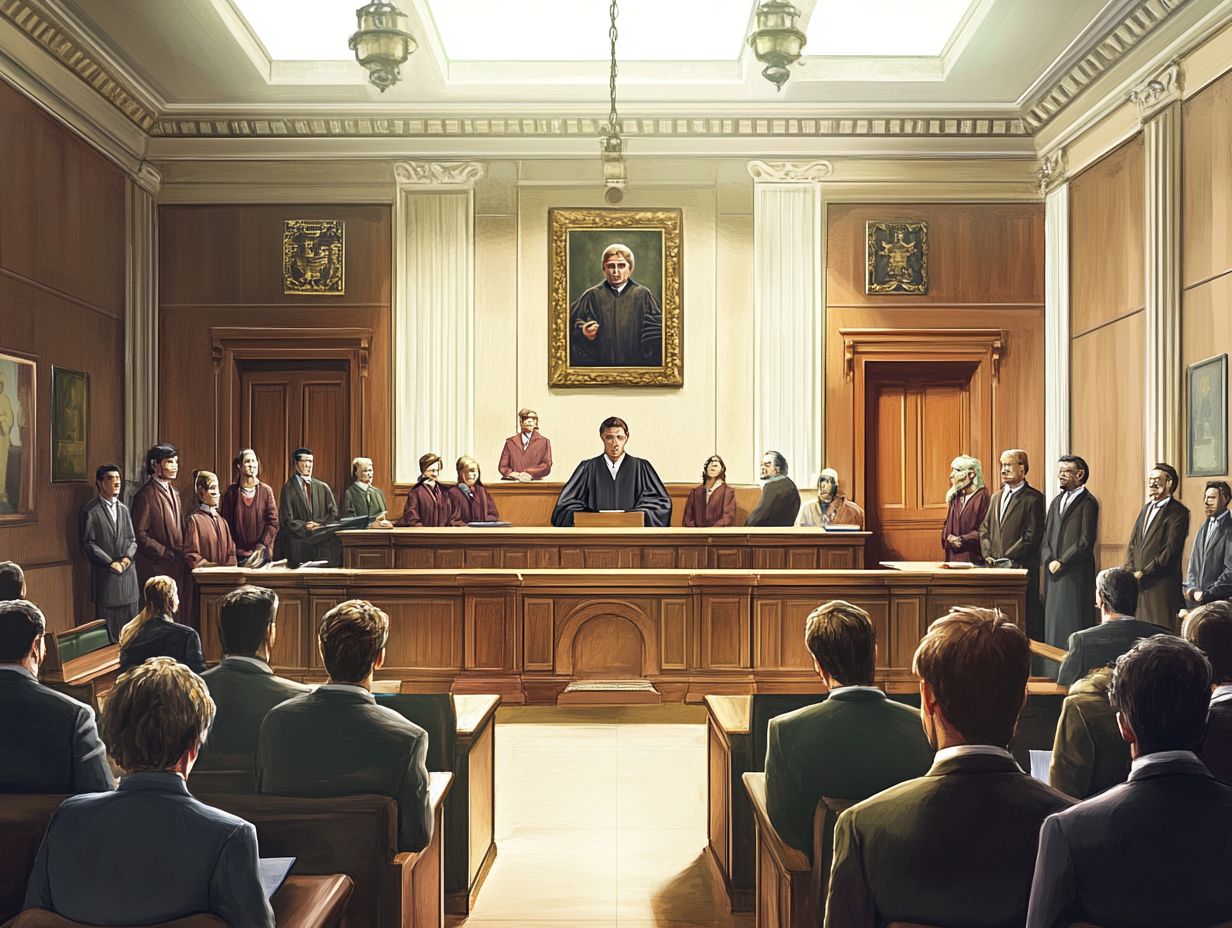
Dressing appropriately for a courtroom appearance is essential. It showcases your understanding of courtroom etiquette and your respect for the legal process.
Choosing the right professional attire can significantly influence how judges and juries perceive you. Men should wear a well-fitted suit, polished shoes, and a conservative tie; colors like navy or gray are essential for projecting authority and professionalism.
Women should consider tailored suits or dresses that fall at or below the knee, complemented by closed-toe shoes that exude sophistication. Avoid overly bright colors and distracting accessories, as a polished appearance demonstrates seriousness and instills confidence in your case.
The Role of the Judge and Jury
The roles of the judge and jury are vital in the courtroom. The judge ensures adherence to courtroom rules and maintains order. The jury represents the community’s views and evaluates the evidence to deliver a verdict.
Their interactions impact the case’s outcome, illustrating the crucial balance of authority and accountability within the legal system.
Understanding the Decision-Making Process
Understanding the decision-making process equips you to anticipate how both the judge and jury might assess the evidence. This insight can dramatically shape your case strategies.
Each phase, from weighing the evidence to final deliberations, plays a crucial role in shaping the outcome. Recognize that jurors engage in discussions that sway opinions, while judges steer these conversations through their interpretations of the law.
Grasping this dynamic enables you to prepare effectively, ensuring that every aspect of your case is robustly supported and compellingly communicated.
Presenting Your Case in Court
Presenting your case marks a pivotal moment in your legal journey. The way you communicate your arguments, evidence, and witness testimony can significantly sway the trial’s outcome.
It’s not just about laying out facts; it involves orchestrating the flow of information through direct and cross-examinations, addressing objections, and crafting a compelling closing statement. Mastering these elements can elevate the persuasiveness of your case and engage the jury s attention.
Tips for Effective Communication
Effective communication in the courtroom is essential for conveying your message clearly to the judge, jury, and everyone present. Employing critical strategies can enhance the impact of your arguments.
Maintain consistent eye contact with the jury to engage them and use clear, accessible language to demystify complex legal concepts. As an attorney, guide your client on how to address different members of the audience appropriately.
Body language conveys confidence and conviction, amplifying your spoken word. By integrating these practices, you can significantly enhance your effectiveness in delivering your message.
Possible Outcomes of a Court Hearing

The outcomes of a court hearing can vary significantly. They can range from a favorable ruling for the plaintiff to a complete dismissal of the case, each with its own legal implications and emotional ramifications.
It s essential for both the plaintiff and the defendant to grasp these potential results. This understanding can guide their subsequent actions, including appealing if the decision falls short of expectations.
By evaluating both the best and worst-case scenarios, you gain strategic insights that help you navigate the legal process with greater effectiveness.
Best and Worst Case Scenarios
Understanding the best and worst-case scenarios of a court hearing can profoundly influence how you prepare for your case. It shapes your expectations and strategic planning.
For instance, if you anticipate a favorable ruling leading to significant compensation, you might decide to invest more in robust legal representation. Additionally, thorough evidence collection can strengthen your position.
On the flip side, if you fear a worst-case scenario like a hefty financial loss or even criminal charges you may lean toward aggressive settlement negotiations to mitigate potential damages.
The emotional landscape of these scenarios is equally critical. As a plaintiff, you might navigate a blend of hope and anxiety, while a defendant could experience feelings of panic or resentment.
Legally, the outcomes can establish a precedent for future dealings, potentially affecting appeals, further negotiations, or even your public image. This makes grasping these scenarios essential for effective preparation.
Appealing a Court Decision
Appealing a court decision is an essential legal process that enables you to challenge the outcome of a trial. You seek a review based on solid legal grounds.
This intricate process is governed by specific rules and timelines, which can vary depending on your area of law and the nature of your case. Grasping the nuances of the appeals process is vital for both plaintiffs and defendants.
It opens a pathway to address perceived injustices and pursue more favorable outcomes. Don’t wait too long to file your appeal; every moment counts!
Understanding the Appeals Process
Understanding the appeals process is essential for anyone contemplating a challenge to a court decision. It shows the steps you need to follow for a successful appeal.
Navigating the complexities of this legal landscape demands a clear understanding of the specific stages involved. First, you must file a notice of appeal, which sets the wheels in motion for the review process.
Engaging legal counsel is crucial. They will meticulously guide you through the nuances, ensuring that all arguments are presented with clarity and precision.
Being well-versed in the rules of your area of law is paramount. Even minor oversights regarding deadlines or required documentation can derail your appeal entirely. Adopting this structured approach is vital for maximizing your chances of overturning an unfavorable ruling.
Frequently Asked Questions
It’s crucial to know how to prepare for a court hearing. Here are some common questions:
How should I dress for court?
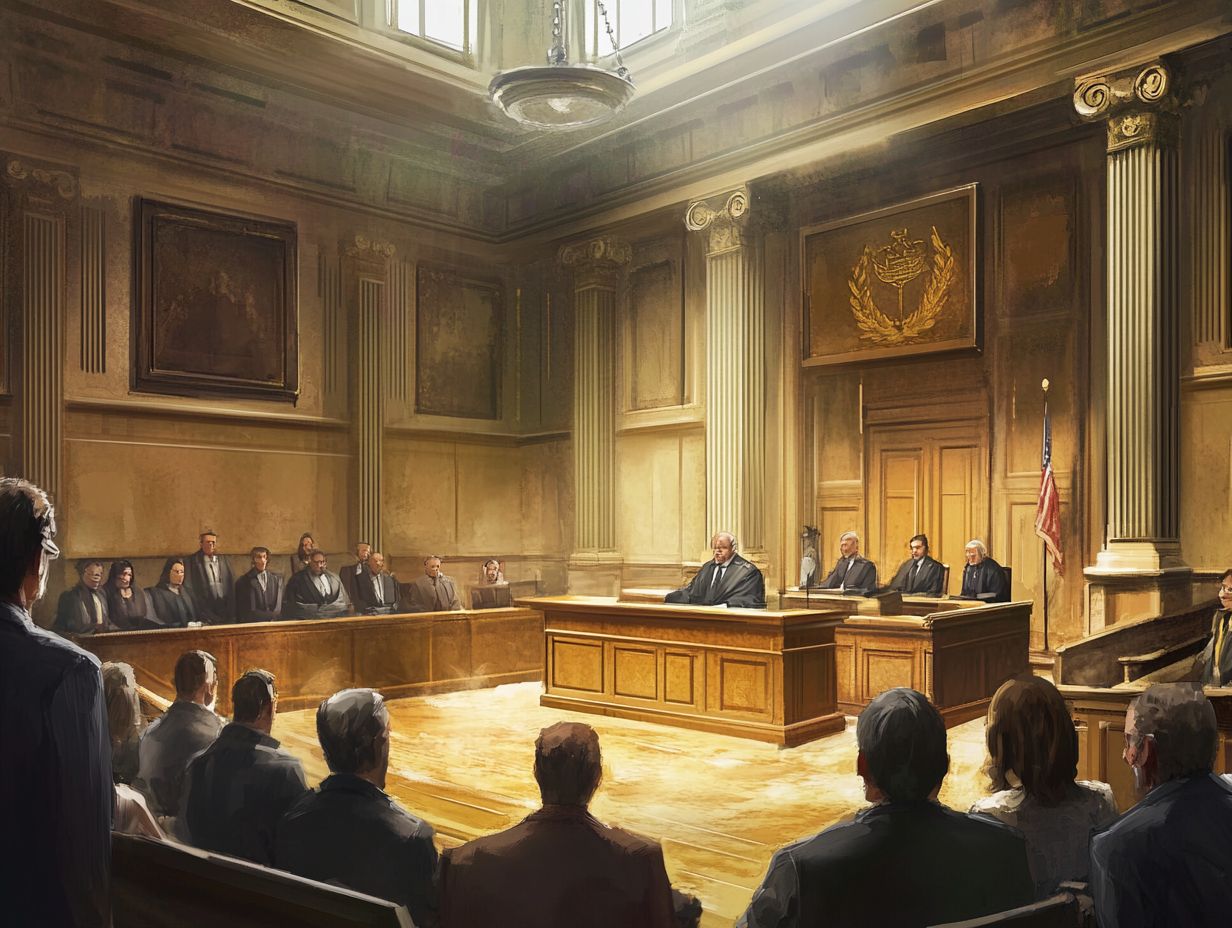
It is important to dress professionally and conservatively for a court hearing. This means avoiding revealing or casual clothing and opting for business attire. Dressing appropriately shows respect for the court and can make a good impression on the judge or jury.
Will I have to speak in court during the hearing?
It depends on the type of court hearing you are attending. If you are a witness or a party to the case, you may be required to speak. However, if you are there as a spectator or support person, you will not be expected to speak. For those involved, it’s important to know what to expect during a criminal trial.
What documents should I bring to the court hearing?
You should bring any documents that are relevant to your case or that have been requested by the court. This may include legal documents, contracts, receipts, or any other evidence that supports your case.
It is important to have all necessary documents organized and easily accessible.
What is the difference between a bench trial and a jury trial?
In a bench trial, the judge makes all the decisions, and there is no jury present. In a jury trial, a group of people from the community act as the fact finders and make a decision based on the evidence presented.
Both types of trials follow the same legal procedures, but the decision-making process is different.
How long does a court hearing typically last?
The length of a court hearing can vary greatly, depending on the complexity of the case and the number of parties involved. Some hearings may only take a few minutes, while others can last for hours or even days.
It is important to be prepared to stay for the entire duration of the hearing.
Can I bring a support person with me to the court hearing?
Yes, you are allowed to bring a support person with you to a court hearing. This could be a friend, family member, or legal representative.
However, your support person is not allowed to speak on your behalf unless they are also officially representing you as your lawyer.


